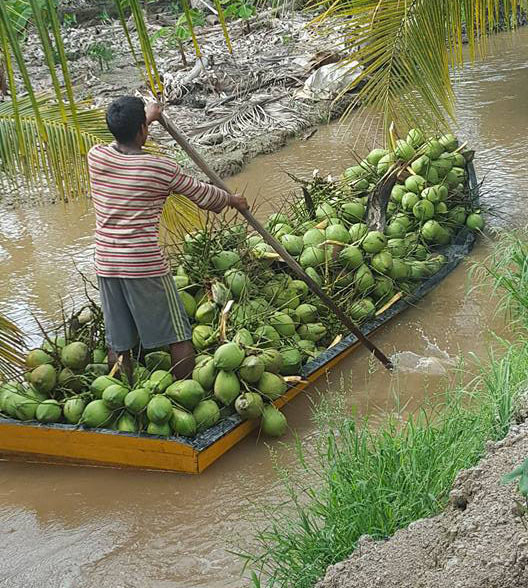Driven by a health and wellness trend, the global demand for fresh coconuts, coconut-based products and value-added products are at an all-time high and is projected to continue to grow exponentially. Presently, demand at both the global and regional levels now exceeds supply with the production base seriously lagging behind.
In the Caribbean the pace of the sector’s growth has been compromised by aging plantations, lack of quality planting material, prevalence of pests and diseases, a sustained lack of investment and financial and technological constraints.
Recognising the potential of the industry, the European Union (EU) and the African, Caribbean and Pacific (ACP) Secretariat funded the four-year project “Coconut Development for the Carib-bean” which is being jointly implemented by the Caribbean Agricultural Research and Development Institute (CARDI) and the International Trade Centre (ITC) in 11 CARIFORUM countries. The project aims to enhance farming productivity, business capacity and the competitiveness of small scale farmers and small and medium-sized enterprises (SMEs) along the coconut value chain.
To effectively address the multitude of challenges the project partners have been working at the bottom of the Pyramid to revitalise the sector. To date we have directly worked with over 1700 farmers/ small and medium-sized enterprises. By empowering and building capacity among this demographic, livelihoods are being directly improved, rural communities are being developed and new opportunities for investments are opening up.
In the Caribbean risks are an integral element of any agricultural endeavour. On a daily basis, producers of fresh and processed products in the Caribbean are faced with diverse challenges ranging from adverse weather and pests and diseases to unfair market competition. The project has been working to change this dynamic for small scale coconut producers and processors. Both ITC and CARDI have been working to upgrade the capacity of support institutions, from lenders to agricultural research and extension services; to build market linkages to buyers; and to other value chains in the region, such as tourism. The ultimate objective is to translate higher competitiveness and better business capabilities into more favourable conditions for trade, high value product development and increased in-comes for small-scale farmers and processors. In addition, to supplement farmers’ incomes in the five to eight years needed to fully rehabilitate or expand coconut plantations, the project is supporting farmers to intercrop coconut trees with plantain, banana and cash crops to diversify income streams and decrease their exposure to market and environmental risks.
Maria Genao, a female producer from the Dominican Republic has said that after the passage of Hurricane Maria in 2018 “Only the coconut trees survived after flooding on my farm. Diversifying has helped me to supplement my income, secure my family’s well-being and presented me with opportunities for pursuing value added product development using coconuts”.
The implementing agencies continue to play a facilitating role to enhance cooperation between stakeholders so they can realise the required investment, technical and policy support needed to boost the industry. Dialogue between regional partners within the public and private sectors have been initiated and within this context, trade related issues including inter alia the certification of coconut water imports were addressed.
In collaboration with the Regional Organisation for Standards and Quality (CROSQ), the existing CARICOM Regional Standard: Specification for packaged natural coconut water is being revised. This will facilitate easier trading between countries and guarantee a safer quality product for consumers. To be able to meet the demand locally, for coconuts (fresh and processed) countries must be able to increase their production and reduce importation. The project has been working to build self-sufficiency by addressing some fundamental gaps along the value chain. Farmers and processors have been trained on good agricultural practices, nursery management, value added product development and health and food safety standards among other areas. The training of SME processors, in particular, coupled with technical advice from ITC and CARDI have enhanced their capability to meet international health and food safety standards and improved efficiency through embracing lean production methods.
The unavailability of quality planting material has been cited as a major setback in expanding the industry.
To increase the availability and accessibility of quality planting material 37 nurseries have been established across the Region from which over 5,000 farmers have been able to access quality seedlings for commercially important varieties. The importation of tissue culture material from Mexico into the Caribbean has complemented this initiative representing a further boost to the revitalisation of the sector.
Under the project’s implementation approach, known as Alliances for Action, ITC, CARDI and national stakeholders have built on the sector roadmaps, to identify specific geographic areas where coconut farmers and processors have considerable potential to connect to international value chains. In these areas, local business alliances have been set up to link farmers to buyers as well as to national institutions that can help build capacity. To complement this, the implementing agencies continue to deliver an integrated package of technical assistance to farmers, processors and support institutions, who are actually guiding the process of identifying key constraints and working together to solve problems along the value chain.
Through the Alliances for Action framework, CARDI and ITC are working to build stakeholder capacity, secure investment and generate business to develop sustainable, inclusive and resilient value chains in the coconut sector across the Caribbean.
-Caribbean Agricultural Research and Development Institute








